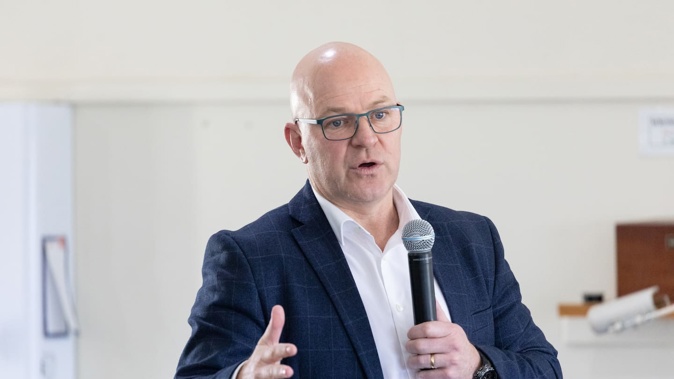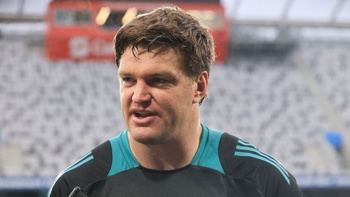
Mental Health Minister Matt Doocey says he expects to receive a plan for a new mental health crisis system ‘very soon’. But Alex Spence reports that frontline clinicians are worried police are planning to pull back before a new system can meet the rising tide of mental distress.
Police plans to attend fewer mental health-related incidents have alarmed frontline clinicians, who say they are concerned people experiencing a psychological crisis could fall through the cracks while a new health-led system is established.
Frustrated that officers’ time has increasingly been taken up by responding to calls involving distressed or suicidal people, Police Ministers and officials have said they want to reprioritise their workloads to focus on “core” criminal justice activities, such as investigating organised crime, gangs and firearms offences.
The New Zealand Police, the Ministry of Health and Health NZ - Te Whatu Ora have developed a five-year plan for a new system for supporting people in a mental health crisis led by health professionals, with police officers playing a more limited role.
Mental Health Minister Matt Doocey told the Herald he expects to receive their joint report “very soon” and for it to be presented to Cabinet in April or May.
Crisis response is an area “that we’re not doing very well”, Doocey said, but he insisted the Government is committed to creating a continuous system that provides rapid support to people in psychological distress.
Several clinicians in different parts of the country told the Herald police have already signalled informally at a local level that they will shift sooner than expected, in months rather than years, to a policy of only responding to mental health-related calls if there is an immediate risk to someone’s physical safety.
The clinicians fear that if the police start pulling back before the Government has established a comprehensive health-led system, it will put more pressure on mental health providers, hospital emergency departments and other services already depleted by years of underfunding and crippling workforce shortages. They are also worried more people will be isolated at times of acute distress.
Doocey said he had not heard of police informally indicating they would not wait until a new system has been established to change their approach, but a senior mental health clinician at Health NZ said: “That’s definitely on the cards.”
A psychiatrist in Wellington said: “The initial proposal was that this would come in over a couple of years but we’re now hearing that it will be implemented around September or October. Lots of mental health clinicians are deeply concerned.”
At Whakarongorau, the national telehealth service, which operates phone lines dedicated to triaging people in mental distress, staff last week raised concerns police seem to be already refusing some requests to conduct “welfare checks” on troubled callers that they previously would have accepted.
One nurse at Whakarongarau said they feared being “stuck in the middle” if police refuse to respond to mental health calls because the crisis teams operated by Health NZ are too short-staffed to visit those people, or may not accept it is their responsibility if the person does not have a recognised psychiatric condition underlying their distress.
“The system is beyond crisis,” the nurse said. “It’s on its last legs.”
In a statement, New Zealand Police said it had been meeting regularly with Health NZ and advised officials it is “progressing internal planning on a new approach to our mental health demand”. It said no new policies or procedures have been introduced “as of today”.
“These operational changes are still in the early planning stages,” a spokesperson said.
Rates of psychological distress have soared in recent years. According to the latest NZ Health Survey, the percentage of Kiwis who experienced high or very high distress in the past month has nearly doubled to 12 per cent in the last decade. The trend is worse among adolescents.
Those people have varied reasons for experiencing distress and not all have a diagnosable mental illness. One consistent thing, however, is that services can be fragmented, confusing, unresponsive, and hard to access when they need help.
In many situations requests for help go through 111, where under the existing arrangements the Police say the only practical assistance a dispatcher can usually provide is sending a police officer to check on the distressed person. Often police would then take the person to a hospital ED to wait for assessment by mental health specialists.
Over the past decade, police say, the number of mental health events officers attend has increased by more than 150 per cent to 77,043 in the last financial year. The vast majority of these were “low to moderate risk in safety, and do not require a police presence,” a spokesperson said.
In ministerial briefings, New Zealand Police executives have complained these callouts drain resources that could be diverted to crimefighting. They say officers who have minimal training in dealing with mentally unwell people often end up in volatile, complicated situations with limited medical information and no back-up from mental health professionals.
Officers sometimes sit for hours with distressed people in EDs waiting for them to be assessed by mental health teams. “It is not uncommon for a single mental health incident to take two staff four to six hours to manage,” officials wrote in one ministerial briefing obtained under the Official Information Act.
The current system of responding to crisis calls is stressful and demoralising for frontline officers, police officials argue, and unsuitable for people in distress who should be seen promptly by professionals with appropriate training and expertise.
Police ministers and officials began pushing to shift the burden of crisis calls to health services under the previous Labour Government.
In March 2023, Police Minister Stuart Nash told Health Minister Ayesha Verrall: “Ultimately, my preference is for police to only be involved in a mental health incident if there is an immediate risk to the safety of the individual or others around them.”
Former Police Minister Stuart Nash told colleagues last year: “Ultimately, my preference is for police to only be involved in a mental health incident if there is an immediate risk to the safety of the individual or others around them.” Photo / Mark Mitchell
In August, the Government announced that police and the health departments were working on a five-year plan to transition to a “multi-agency” national crisis-response system.
The plans are expected to include improved triaging for people when they first reach out for help; increased use of telehealth and digital counselling initiatives; mobile “co-response” teams made up of police, paramedics and mental health nurses; and crisis hubs that distressed people can go to instead of waiting in crowded and chaotic EDs. Police would still have a role when there is a threat to safety.
“It is going to be a big piece of work,” Doocey said, although he would not comment on specific details or the potential cost of the reforms until he has had a chance to consider the agencies’ joint recommendations.
Speaking generally, Doocey said he wants a continuous multi-agency system that provides a range of interventions depending on people’s varied needs. Not every call for help requires a police presence, Doocey said, and not everyone in distress needs to be seen by a specialist mental health clinician. Some people are stressed because of life events and social pressures that could be better resolved by the Ministry of Social Development.
Some crisis response initiatives are already in development. This month, Doocey announced the Government intends to embed peer support workers with first-hand experience of mental illness in EDs at four hospitals to comfort people in distress, at a cost of about $2 million a year. If successful, peer support workers will be introduced at other hospitals.
Police ministerial briefings acknowledged there are “substantial financial and resourcing risks” to transitioning to a new crisis-response system. Moving from a police-led response to a health-led response without adequate resourcing for those health services would, one document said, “simply shift the demand from Police to those services” and increase the number of people in crisis.
Some clinicians worry this is what will happen in the coming months. They say the existing patchwork of services for people in crisis is so disjointed, underfunded and understaffed it would take many years and hundreds of millions of dollars of additional Government investment to create a coherent national system capable of meeting the rising tide of distress.
Karla Bergquist, director of specialist mental health services at Health NZ, acknowledged mental health services are under pressure but said “when a person needs acute mental health care, they are always prioritised and seen urgently”.
Whakarongorau said it is examining how its phone lines will be impacted by a change of approach by the police. It acknowledged its staff’s concerns about the welfare checks and said it is working to understand them and ensure that those clinicians “feel supported through any changes in approach or workload”.
Alex Spence is an investigative reporter and feature writer focusing on social issues. He joined the Herald in 2020 after 17 years in London where he worked for The Times, Politico, and BuzzFeed News. He can be reached at [email protected] or by text or secure Signal messaging on 0272358834.
Where to get help
If it is an emergency and you or someone else is at risk, call 111.
For counselling and support
Lifeline: Call 0800 543 354 or text 4357 (HELP)
Suicide Crisis Helpline: Call 0508 828 865 (0508 TAUTOKO)
Need to talk? Call or text 1737
Depression helpline: Call 0800 111 757 or text 4202
For children and young people
Youthline: Call 0800 376 633 or text 234
What’s Up: Call 0800 942 8787 (11am to 11pm) or webchat (11am to 10.30pm)
For help with specific issues
Alcohol and Drug Helpline: Call 0800 787 797
Anxiety Helpline: Call 0800 269 4389 (0800 ANXIETY)
OutLine: Call 0800 688 5463 (0800 OUTLINE) (6pm-9pm)
Safe to talk (sexual harm): Call 0800 044 334 or text 4334
All services are free and available 24/7 unless otherwise specified.
For more information and support, talk to your local doctor, hauora, community mental health team or counselling service. The Mental Health Foundation has more helplines and service contacts on its website.
Take your Radio, Podcasts and Music with you









